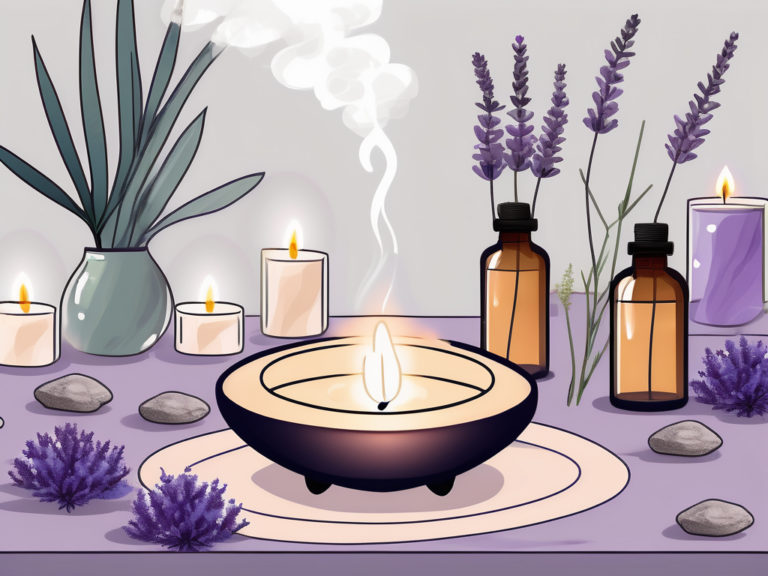The Essential Role of Family Doctors in Utilizing Essential Oils
Essential oils have been used for centuries for their therapeutic properties and aromatic qualities. In recent years, there has been a growing interest in the use of essential oils as a complementary therapy in healthcare. Family doctors, as primary care providers, play an essential role in exploring and integrating essential oils into their practice. In this article, we will delve into the basics of essential oils, the role of family doctors in health maintenance, the integration of essential oils into family medicine, the doctor-patient dialogue on essential oils, and future perspectives on their use.
Understanding the Basics of Essential Oils
Before we explore the role of family doctors in utilizing essential oils, it’s crucial to have a basic understanding of what they are. Essential oils are highly concentrated plant extracts obtained through steam distillation or cold pressing. Each essential oil has a unique composition of volatile compounds that contribute to its distinct properties and potential therapeutic benefits.
The Science Behind Essential Oils
Essential oils have been widely studied for their potential benefits in various health conditions. They can affect the body through inhalation, topical application, or even ingestion, although the latter should be done under the supervision of a healthcare professional. The volatile compounds in essential oils can interact with our olfactory system, limbic system, and even exert antimicrobial and anti-inflammatory effects.
Common Types of Essential Oils and Their Uses
There are numerous essential oils available, each with its own set of potential benefits. Some commonly used essential oils include lavender, peppermint, eucalyptus, tea tree, and chamomile. Lavender, for example, is known for its calming properties and may be used to promote relaxation and improve sleep quality. Peppermint, on the other hand, has a refreshing scent and may help alleviate headaches and support digestion.
Another essential oil that has gained popularity in recent years is eucalyptus. Eucalyptus oil is known for its invigorating aroma and potential respiratory benefits. It is often used in aromatherapy to help clear the sinuses and promote easier breathing. Additionally, eucalyptus oil can be found in some topical products, such as chest rubs, to provide soothing relief for congestion and coughs.
Tea tree oil is another versatile essential oil that has been widely recognized for its antimicrobial properties. It is commonly used in skincare products due to its potential to combat acne-causing bacteria and soothe skin irritations. Tea tree oil can also be used as a natural household cleaner, as it has been shown to have effective antimicrobial activity against various pathogens.
The Role of Family Doctors in Health Maintenance
Family doctors serve as the first point of contact for individuals seeking medical care. They have a broad scope of practice, encompassing preventive care, diagnosis, treatment, and management of various health conditions. In their role as primary care providers, family doctors have a unique opportunity to integrate essential oils into their practice and provide holistic care to their patients.
The Broad Scope of Family Medicine
Family medicine emphasizes comprehensive and continuous healthcare for individuals of all ages. Family doctors are trained in various medical areas, allowing them to address a wide range of health concerns. By incorporating essential oils into their practice, family doctors can offer additional therapeutic options to their patients, promoting overall well-being.
For example, when treating patients with respiratory issues, family doctors can recommend essential oils such as eucalyptus or peppermint, known for their decongestant properties. These oils can be used in inhalation therapy or diluted for topical application, providing relief and improving respiratory function. By considering the specific needs of each patient, family doctors can tailor their treatment plans to include essential oils that complement traditional medical approaches.
The Importance of Personalized Care in Family Medicine
One of the fundamental principles of family medicine is providing personalized care tailored to each patient’s needs. Essential oils can complement this approach by offering individualized solutions. Family doctors can consider factors such as a patient’s medical history, current medications, and specific health goals when recommending essential oils. This personalized approach ensures the effective and safe use of essential oils in healthcare.
Moreover, family doctors can educate their patients about the proper use and dosage of essential oils. By providing clear instructions and guidance, they empower patients to take an active role in their own health and well-being. This collaborative approach fosters a strong doctor-patient relationship, built on trust and shared decision-making.
Furthermore, family doctors can stay up-to-date with the latest research on essential oils and their therapeutic benefits. This knowledge allows them to make informed recommendations based on scientific evidence, ensuring the highest standard of care for their patients. By continuously expanding their knowledge in this field, family doctors can remain at the forefront of integrative medicine and provide comprehensive healthcare that addresses both the physical and emotional aspects of their patients’ well-being.
Integrating Essential Oils into Family Medicine
As family doctors continue to play a pivotal role in health maintenance, integrating essential oils into their practice can enhance patient care and outcomes. Understanding the potential benefits and risks associated with essential oils is paramount in this process.
Potential Benefits of Essential Oils in Healthcare
Essential oils have shown promise in various healthcare applications. For instance, certain essential oils possess antimicrobial properties and may help combat bacterial or fungal infections. Tea tree oil, for example, has been found to have potent antimicrobial effects against a wide range of pathogens, including antibiotic-resistant strains.
In addition to their antimicrobial properties, essential oils such as lavender or chamomile have been recognized for their calming and soothing effects. These oils can be beneficial in managing stress, anxiety, and sleep disorders, providing patients with a natural alternative to pharmaceutical interventions.
Furthermore, essential oils like peppermint or ginger have been used for their digestive benefits. They can help alleviate symptoms of indigestion, bloating, and nausea, providing patients with a gentle and natural way to support their digestive health.
Risks and Precautions in Using Essential Oils
While essential oils can provide significant benefits, it is important to recognize that they are potent substances and should be used with caution. Some individuals may have allergies or sensitivities to specific essential oils, which can lead to skin irritation or respiratory issues. It is crucial for family doctors to conduct thorough assessments of their patients’ medical history and allergies before recommending the use of essential oils.
Additionally, essential oils should always be diluted before topical application to avoid adverse skin reactions. Carrier oils, such as coconut or jojoba oil, can be used to dilute essential oils and ensure their safe use on the skin. Family doctors play a crucial role in educating patients about these risks and ensuring their safe and appropriate use of essential oils.
Moreover, it is important to note that essential oils should not be ingested without proper guidance from a healthcare professional. Ingesting essential oils can have serious health consequences and should only be done under the supervision of a qualified practitioner.
By integrating essential oils into family medicine, doctors can provide their patients with additional support in managing their health conditions naturally. However, it is essential for healthcare providers to stay updated on the latest research and guidelines regarding essential oil use to ensure the best possible care for their patients.
The Doctor-Patient Dialogue on Essential Oils
An open and informative doctor-patient dialogue is essential when discussing the use of essential oils. Family doctors can educate patients about the fundamentals of essential oils, their potential benefits, and any precautions to be aware of. Taking the time to address patient concerns and misconceptions is vital in establishing trust and ensuring informed decision-making.
Educating Patients about Essential Oils
Patients may have varying levels of knowledge and understanding when it comes to essential oils. Family doctors can provide comprehensive information on the safe use, potential interactions, and appropriate dosage of essential oils. By empowering patients with accurate information, family doctors can facilitate their active participation in their healthcare journey.
Addressing Patient Concerns and Misconceptions
It is not uncommon for patients to have concerns or misconceptions about essential oils, especially if they have limited knowledge or have encountered conflicting information. Family doctors can alleviate these concerns by discussing the scientific evidence supporting the use of essential oils, as well as any potential limitations or contraindications. Building open and trustful communication ensures patients feel heard and involved in their treatment plans.
Furthermore, family doctors can also provide guidance on the quality and sourcing of essential oils. With the increasing popularity of essential oils, there has been a surge in the market, making it crucial for patients to know how to choose high-quality oils. Doctors can educate patients on factors such as sourcing, extraction methods, and third-party testing to ensure they are using oils that meet safety and efficacy standards.
In addition to addressing concerns and providing information, family doctors can also discuss the potential risks and side effects associated with essential oil use. While essential oils are generally considered safe when used properly, it is important for patients to be aware of any potential adverse reactions or interactions with medications they may be taking. By having an open dialogue, doctors can help patients make informed decisions and avoid any potential complications.
Future Perspectives on Essential Oils in Family Medicine
As the field of healthcare continues to evolve, so too does the exploration of essential oils in family medicine. Ongoing research is shedding light on new potential applications and further understanding of their mechanisms of action.
Current Research on Essential Oils in Healthcare
Scientists and healthcare professionals are actively studying the effects of essential oils in various areas of medicine. From exploring their antibacterial properties to investigating their potential in pain management, research efforts continue to expand our knowledge. For example, recent studies have shown promising results in the use of lavender essential oil for reducing anxiety and promoting relaxation in patients undergoing medical procedures.
Furthermore, researchers are also investigating the potential of essential oils in managing chronic conditions such as asthma and arthritis. Preliminary findings suggest that certain essential oils, such as eucalyptus and peppermint, may have anti-inflammatory properties that could provide relief to patients suffering from these conditions.
The Potential of Essential Oils in Future Medical Practice
The integration of essential oils into family medicine holds the potential for exciting advancements in patient care. As scientific evidence accumulates and our understanding grows, essential oils may become more widely accepted as a valuable addition to conventional healthcare. Family doctors, with their comprehensive understanding of their patients’ health needs, are uniquely positioned to lead and champion this integration.
Moreover, essential oils have the potential to enhance the overall patient experience in healthcare settings. The use of aromatherapy, a practice that involves inhaling essential oils, has been shown to reduce stress and improve mood in patients. By incorporating aromatherapy into their practice, family doctors can create a more calming and comforting environment for their patients, ultimately contributing to better overall well-being.
In conclusion, family doctors play an essential role in utilizing essential oils and integrating them into their practice. With a solid understanding of the basics, potential benefits, and risks associated with essential oils, family doctors can provide personalized and holistic care to their patients. By fostering open communication and staying informed about ongoing research, family doctors can lead the way in utilizing essential oils in family medicine, ultimately enhancing patient well-being and outcomes.






